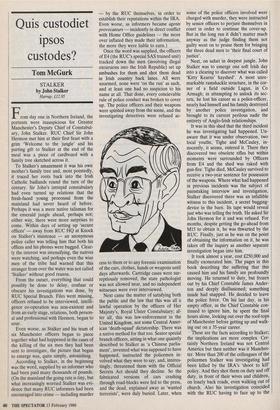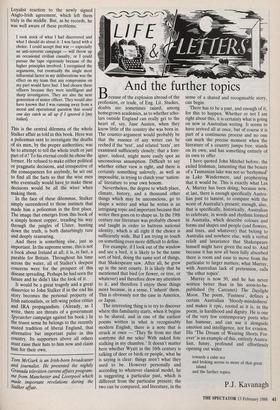Quis custodiet ipsos custodes?
Tom McGurk
STALKER by John Stalker Harrap, £12.95 From day one in Northern Ireland, the portents were inauspicious for Greater Manchester's Deputy Chief of Constabul- ary, John Stalker. RUC Chief Sir John Hermon met him at their first feast with a grim 'Welcome to the jungle' and his parting gift to Stalker at the end of the meal was a piece of cardboard with a family tree sketched across it.
To Stalker's amazement it was his own mother's family tree and, most pointedly, it traced her roots back into the Irish Catholic badlands round the turn of the century. Sir John's intrepid constabulary had even turned up relations that the fresh-faced young proconsul from the mainland had never heard of before. Perhaps it was a mere native talisman for the emerald jungle ahead, perhaps not; either way, there were more surprises to come. Within days of setting up 'secure offices' — away from RUC HQ at Knock on Stalker's insistence — an anonymous police caller was telling him that both his offices and his phones were bugged. Clear- ly the interest was intensifying, the natives were watching, and perhaps even the wise men of the tribe had warned that this stranger from over the water was not called `Stalker' without good reason.
From the outset, everything that could possibly be done to delay, confuse or obscure his investigations was done, by RUC Special Branch. Files went missing, officers refused to be interviewed, intelli- gence co-operation was non-existent and from an early stage, relations, both person- al and professional with Hermon, began to sour.
Even worse, as Stalker and his team of six Manchester officers began to piece together what had happened in the cases of the killing of the six men they had been sent to investigate, the picture that began to emerge was, quite simply, astonishing.
According to Stalker, in the beginning was the word, supplied by an informer who had been paid many thousands of pounds. (On the mainland the going rate is tiny, but what increasingly worried Stalker was evi- dence that many RUC informers had been encouraged into crime — including murder — by the RUC themselves, in order to establish their reputations within the IRA. Even worse, as informers became agents provocateurs — incidently in direct conflict with Home Office guidelines — the more over inflated they made their information, the more they were liable to earn.) Once the word was supplied, the officers of E4 (the RUC's special SAS trained unit) tracked down the men (involving illegal excursions into the Irish Republic) set up ambushes for them and shot them dead in Irish country back lanes. All were unarmed, none were 'on the run' as such, and at least one had no suspicion to his name at all. That done, every concievable rule of police conduct was broken to cover up. The police officers and their weapons were spirited away from the scene, and the investigating detectives were refused ac- cess to them or to any forensic examination of the cars, clothes, hands or weapons until days afterwards. Cartridge cases were sur- reptiously removed, the state pathologist was not allowed near, and no independent witnesses were ever interviewed.
Next came the matter of satisfying both the public and the law that this was all a lawful operation by the officers of Her Majesty's, Royal Ulster Constabulary; af- ter all, this was law-enforcement in the United Kingdom, not some Central Amer- ican 'death-squad' dictatorship. There was a native method for that too. Senior special branch officers, sitting in what one quaintly described to Stalker as 'a Chinese parlia- ment', invented what was supposed to have happened, instructed the policemen in- volved what they were to say, and, interes- tingly, threatened them with the Official Secrets Act should they decline. So the fabricated versions of cars crashing through road-blocks were fed to the press, and the dead, explained away as 'wanted terrorists', were duly buried. Later, when some of the police officers involved were charged with murder, they were instructed by senior officers to perjure themselves in court in order to continue the cover-up.
But in the long run it didn't matter much anyway as the judge finding them not guilty went on to praise them for bringing the three dead men to 'their final court of justice'.
Next, on safari in deepest jungle, John Stalker was to emerge one soft Irish day into a clearing to discover what was called `Kitty Kearns' hayshed'. A most unre- markable ramshackle structure, in the cor- ner of a field outside Lugan, in Co Armagh; in attempting to unlock its sec- rets, he lost his career as a police-officer, nearly had himself and his family destroyed by another police investigation, and brought to its current perilous nadir the entirety of Anglo-Irish relationships.
It was in this shed that the third incident he was investigating had happened. Un- aware that it was under observation, two local youths, Tighe and McCauley, in- nocently, it seems, entered it. There they discovered two obsolete rifles but within moments were surrounded by Officers from E4 and the shed was raked with gun-fire. Tighe died, McCauley survived to receive a two-year sentence for possession of the weapons. Where what had happened in previous incidents was the subject of painstaking interview and investigation, Stalker discovered there was an infallible witness to this incident, a secret bugging- device in the barn. Its tape would reveal just who was telling the truth. He asked Sir John Hermon for it and was refused. For months, despite getting the go-ahead from M15 to obtain it, he was thwarted by the RUC. Finally, just as he was on the point of obtaining the information on it, he was taken off the inquiry as another separate investigation began into him.
It took almost a year, cost £250,000 and finally exonerated him. The pages in this book describing the suffering that this caused him and his family are profoundly moving. He returned to duty, but frozen out by his Chief Constable James Ander- ton and deeply disillusioned; something inside had snapped. He_ecided to leave the police force. On hiss last day, in his empty office, as the Chief Constable con- tinued to ignore him, he spent the final hours alone, looking out over the roof-tops of Manchester before getting up and walk- ing out on a 35-year career.
These are the facts according to Stalker; the implications are more complex. Cer- tainly Northern Ireland was not Central America but then neither was it Manches- ter. More than 200 of the colleagues of the policemen Stalker was investigating had been killed by the IRA's 'shoot to kill' policy. And they shot them on duty and off duty, in front of their wives and children, on lonely back roads, even walking out of church. Also his investigation coincided with the RUC having to face up to the Loyalist reaction to the newly signed Anglo-Irish agreement, which left them truly in the middle. But, as he records, he was well aware of these problems.
I took stock of what I had discovered and what I should do about it. I was faced with a choice. I could accept that war — especially an anti-terrorist campaign — will throw up an occasional civilian casualty, or I could pursue the tape vigorously because of the higher principles involved. I recognised the arguments, but eventually the single most influential factor in my deliberations was the effect on my team that any compromise on my part would have had. I had chosen these officers because they were intellligent and sharp investigators. They are also the next generation of senior officer. They would also have known that I was running away from a moral and operational question that would one day catch us all up if I ignored it [my italics].
This is the central dilemma of the whole Stalker affair as told in this book. Here was a policeman sent to investigate the deaths of six men, by the proper authorities; was he to attempt to tell the whole truth or just part of it? To his eternal credit he chose the former. He refused to make either political or pragmatic decisions, and irrespective of the consequences for anybody, he set out to find all the facts so that the wise men who eventually would have to make these decisions would be all the wiser when making them. In the face of these dilemmas, Stalker simply surrendered to those instincts that made him a policeman in the first place. The image that emerges from this book of a simply honest copper, treading his way through the jungles of Ulster, hunting down the truth, is both disturbingly rare and deeply reassuring. And there is something else, just as important. In the supreme sense, this is not a book about Ireland at all; it is, in fact, a parable for Britain. Throughout his time across the water, all of Stalker's deepest concerns were for the prospect of this disease spreading. Perhaps he had seen the future and he didn't like the look of it.
It would be a great tragedy and a great disservice to John Stalker if in the end his story becomes the personal property of Irish nationalists, or left-wing police critics and IRA propagandists. (Already, as I write, there are threats of a government Spycatcher campaign against his book.) In the truest sense he belongs to the recently muted tradition of liberal England, that alternative but important pulse in this country. Its supporters above all others must raise their hats to him now and claim him for their own.
Tom McGurk is an Irish-born broadcaster and journalist. He presented the nightly Granada television current affairs program- me from Manchester and Liverpool which made important revelations during the Stalker affair.



























































 Previous page
Previous page